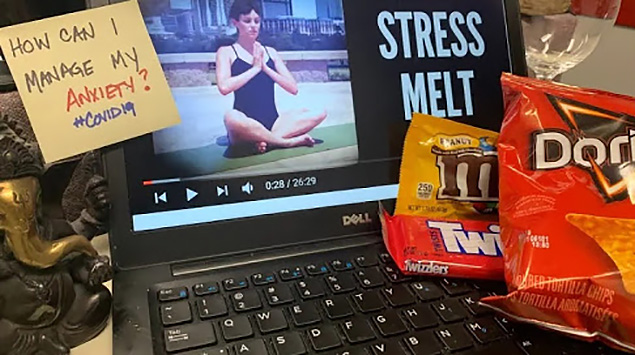Anybody out there remember what you were most concerned about a year ago?
Or what might be tickling your fancy?
Anybody remember if your stress level was especially high back then?
Thought so.
Things sure have changed, eh?
Anxiety rules.
And, in oh so many ways.

Canadians are dealing with unprecedented amounts of anxiety around the pandemic, according to several surveys and the popularity of certain Google searches. (Shutterstock)
My colleague Marc Montgomery reported last week that Canadians are drinking more.
That’s according to a a poll commissioned by the Canadian Centre for Substance Use and Addiction.
Probably no surprise there.
Earlier this month, Statistics Canada published a survey on how Canadians are coping with the COVID-19 pandemic.

Manitoba mental health providers want people to know there are resources to help them get through increased anxiety during the COVID-19 pandemic. (panitanphoto/Shutterstock)
The survey found that 84 per cent of Canadians are “very” or “extremely” anxious about overloading the health system and 54 per cent were “very” or “extremely” anxious about the health of a household member.
Gee, do ya think?
The agency released more data today--showing that 58 per cent of people over the age of 75 are “very” or “extremely” stressed about their own health and that 48 per cent of survey participants between 15 and 24 reported a major or moderate impact on their ability to meet their financial obligations and essential needs.
In its report earlier this month, Statistics Canada said it found that 68 per cent of all Canadians are spending more time on the Internet.
And a CBC News story published today shows the sites they are surfing are a long way from where they headed a year ago.
Making use of Google Trends, data reporter Roberto Rocha compared the most popular web searches between March 1 April 15 last year and this year–the results of which are contained here.

A resident reads outdoors after working from home all day in Ottawa on Tuesday, March 24, 2020. (Justin Tang/Canadian Press)
Among other things, Rocha found that Google searches for topics related to anxiety reached an all-time high in March.
Meanwhile searches with the word “bored” peaked at the same time.
Think about that one.
And, Rocha reports, there were also more Google searches for conspiracy theories than a year ago.
“Any good news?”, you ask.
Kinda.
Rocha found that searches for language courses, music instructions and baking are at an all-time high.
He also discovered that newfound interest in bread-making has caused shortages of flour in many cities, and even a shortage of the familiar yellow packaging for flour.
A year ago, that might have been filed in the bad news drawer.
No more.
With files from CBC News (Roberto Rocha), RCI (Marc Montgomery), The Canadian Press







For reasons beyond our control, and for an undetermined period of time, our comment section is now closed. However, our social networks remain open to your contributions.